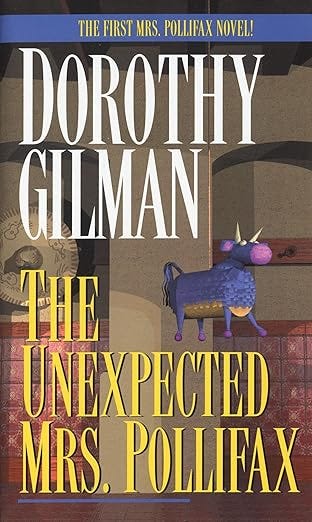Yesterday afternoon I returned from five days in North Bethesda, Maryland, where I attended the Malice Domestic convention for fans of the traditional mystery. These events are always a combination of business and pleasure for me, because I get to see old friends, talk about mystery novels and authors, and of course, sell books.
Mystery reviewer Mark Baker and I led a book group discussion on Thursday evening about Dorothy Gilman and her Mrs. Pollifax books. First published in 1966, widowed Emily Pollifax decides to indulge her lifelong interest in being a spy by showing up at the offices of the CIA and volunteering.
Of course you couldn’t do that today. You probably couldn’t even get past the metal detector without an appointment. But a coincidence sends her on a courier mission to Mexico City, where she’s able to utilize her understanding of human behavior and ability to improvise to kick off a ten-book series. The books are delightful comfort reads, and our group of thirty was a mix of long-time fans and new readers, of all ages.
For me, it was a fun return to a classroom setting without the need to grade papers at the end. People commented and asked interesting questions, and a good time was had by all.
Authors are usually assigned a panel discussion, and mine was titled “Writing in Turbulent Times.” You may be curious what such a panel would entail—I sure was, because our moderator declined to provide any questions in advance.
Usually that’s a red flag. It means the moderator probably hasn’t read anything you’ve written, though maybe he has skimmed through some Amazon descriptions. And it means the moderator hasn’t thought about what would make a good discussion. I’ve been on some terrible panels, where the moderator spent so much time on introductions (him/herself included) that we barely had time to talk about books.
Our moderator had spent a long time in television news, so he apparently believed that throwing questions we weren’t prepared for at us would make for an intriguing panel.
Uh, no. Most authors are introspective types who need to think before they speak. Fortunately I walked in the door with my own talking points, intent on twisting any of his questions to what I wanted the audience to know about me and my books.
For example, he asked how the turbulence in our personal lives affected our writing. Sorry, I wasn’t there for therapy, and I agree with Erica Jong, that the unexamined life is a lot easier to explain to your parents.
While one poor novice author struggled to connect her study of educational psychology to her creative work, I turned the question around to focus on the turbulence created by my dogs. “I spend hours every day researching my books,” I said. “Walking my dogs, feeding my dogs, playing with my dogs, and cleaning up after them when they get sick.”
(Gratuitous photo of Griffin and Brody)
That got a laugh, and I was able to talk about the golden retriever mysteries, which really have no connection to any childhood trauma I experienced.
I did talk about how I think my healing fiction can help people who are stressed out by the news, politics, health issues and so much more. To give some credit to the moderator, he was very good at listening to us and then coming up with follow-up questions. But I think we all would have experienced less turbulence had we had some questions in advance.
I’m pleased to announce that I have two new books out with my beta readers right now. Blood Code, the next Mahu Investigation, is available for pre-order now, as is the second book of healing fiction, The Bridge Between Us. More on those next time!
Best wishes to all for a less-turbulent future!
Neil







I love the Mrs. Pollifax series and am delighted to hear Dorothy Gilman’s awesome series is finding new readers! I’ve re-read them many times over the years and enjoyed them every time, and they’ll always have a place in my permanent collection of actual paperbacks. Thanks for drawing attention to this wonderful series and for your own excellent books, and please give a Brodie and Griffin an extra pat from me.
Oh, I've had that kind of a moderator--when I attempted to "politely" suggest she allow for questions, she held up her pages of notes and said, "I'm not finished with what I want to say yet." Which was all about her, and I think she might have asked each of the panelists a question. And the same one, just going down the line (another pet peeve of mine, especially if they always go in the same order.